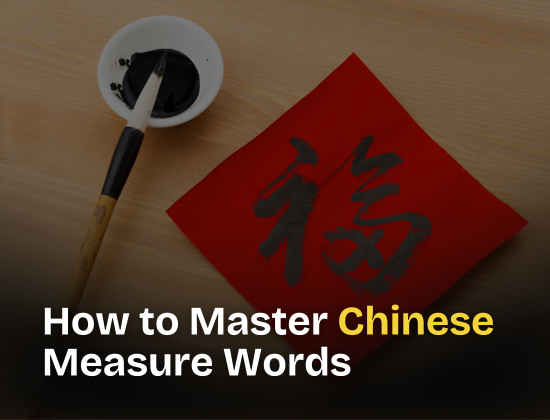
How to Master Chinese Measure Words? Learn ONLINE with The Language SKOOL
Imagine this: You’re at a bustling market in Beijing, eager to buy a fresh apple. You confidently tell the vendor,
Step 1: Think of Measure Words as Containers
One way to grasp measure words is to imagine them as containers. Just like you wouldn’t order "a slice of milk," you can’t use any random measure word in Chinese. For example:
-
ge – the universal container, used when in doubt (but not always the best choice!)
-
zhang – think flat things: paper, tables, and even faces
-
zhi – for small animals and certain objects like hands and eyes
-
ping – bottles of liquid (not apples!)
Step 2: Create Mental Pictures
Let’s meet Alex, a foreigner learning Chinese, who keeps mixing up measure words. One day, he walks into a pet store and proudly says, "Wo yao liang ge gou." The shopkeeper chuckles and corrects him: "Yinggai shuo ‘liang zhi gou.’"
Alex learns that animals have their own measure word: zhi. He imagines each animal wearing a tiny badge that says “I belong to ‘zhi’ club.” Creating these fun mental pictures makes measure words easier to remember.
Step 3: Group Them by Categories
Instead of memorizing dozens of measure words randomly, group them logically:
-
For people: ge for general use, wei for respect
-
For animals: zhi for most, tiao for long ones (like snakes and fish)
-
For objects: zhang for flat things, ben for books, kuai for chunks (like cake)
-
For buildings: zuo for big structures, jian for rooms
Step 4: Practice with Real-Life Scenarios
Next time you’re in a restaurant, try ordering with measure words:
-
yi wan mian – one bowl of noodles
-
yi bei cha – one cup of tea
-
Yi shuang kuaizi – a pair of chopsticks
The more you practice in real-life situations, the more natural they’ll feel.
Step 5: Play Games and Have Fun!
Learning doesn’t have to be boring. Try these fun activities:
-
Measure Word Match: Match objects to their correct measure words
-
Storytelling Challenge: Make up a silly story using different measure words
-
Language Exchange: Ask a native speaker to quiz you on Chinese words
Mastering Chinese measure words takes practice, but with the right mindset and some creativity, you can conquer them! Next time you’re in a market in China, you’ll confidently ask for "yi ke pingguo" – one apple instead of "a bottle of apples."
So, are you ready to master measure words? Start practicing today and turn every mistake into a learning adventure!











